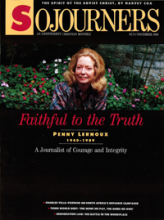EACH TIME I RETURN FROM A TRIP TO THE SOVIET UNION, I resolve to hurry to the library and take out a stack of books on Russian Orthodox Christianity and how it relates to the rest of Russian history. Usually other things intervene.
This time, however, when I got back to the United States in July, I kept my promise to myself. And to my good fortune, I happened upon the three dusty volumes, now long out of print, of the once-famous memoirs of Maurice Paleologue, the French ambassador to Russia from 1914 to 1918.
Like another traveling Frenchman a century earlier, Alexis de Tocqueville, who wrote the classic book on democracy in America, Paleologue was an acute observer of everything his eye fell upon. One of the things that fascinated him most was the simple but tenacious Christian faith of the Russian people. But in writing about it he mentioned some disquieting elements that are all the more interesting 70 years later.
"Are the Russian people as religious as is commonly asserted?" he asked in his diary on June 9, 1915. His answer helped to explain some things that have puzzled me during my four trips to the Soviet Union in the past five years. "The nation," Paleologue said, "is more sincere, or at any rate more Christian, than its Church. In the simple faith of the masses, there is more spirituality, mysticism and evangelism than in the Orthodox theology and ordinances."
Read the Full Article

